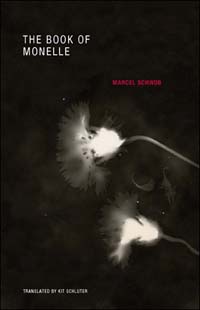25 Points: The Book of Monelle
 The Book of Monelle
The Book of Monelle
by Marcel Schwob
translated by Kit Schluter
Wakefield Press, 2012
136 pages / $12.95 buy from Wakefield Press or Amazon
1. Let’s just start with the fact that this book made me cry. It’s an utterly heartbreaking book, beautiful in the torment and suffering that is manifested through its words. Though Monelle instructs, “Words are words while they are spoken. / Unspoken words are dead and beget the plague. / Listen to my spoken words, and act not according to the words I write,” these written words are the only spectral trace we have left of her.
2. I first heard about the new translation of this significant work at Harriet.
3. The synopsis of the book reads: When Marcel Schwob published The Book of Monelle in French in 1894, it immediately became the unofficial bible of the French symbolist movement, admired by such contemporaries as Stephane Mallarmé, Alfred Jarry, and André Gide. A carefully woven assemblage of legends, aphorisms, fairy tales, and nihilistic philosophy, it remains a deeply enigmatic and haunting work over a century later, a gathering of literary and personal ruins written in a style that evokes both the Brothers Grimm and Friedrich Nietzsche. The Book of Monelle was the fruit of Schwob’s intense emotional suffering over the loss of his love, a “girl of the streets” named Louise, whom he had befriended in 1891 and who succumbed to tuberculosis two years later. Transforming her into Monelle, the innocent prophet of destruction, Schwob tells the stories of her various sisters: girls succumbing to disillusion, caught between the misleading world of childlike fantasy and the bitter world of reality. This new translation reintroduces a true fin-de-siècle masterpiece into English.
4. The Book of Monelle is a book of words, like the Bible, these words may transcend its physical pages. In its biblical and prophetic tone, Monelle, perhaps herself a prophet, speaks of the beginning: “And Monelle said again: I shall speak to you of young prostitutes, and you shall know the beginning.”
5. If Monelle is a prophet, she is utterly of the present, of the moment, and of silence, because in life and suffering everything becomes a mirror to one’s suffering, and because in death there is only silence, but there is also the hope of forgetting.
6. Monelle instructs: “Do not remember, and do not predict.”
7. The translator gives two possible ways to interpret the name Monelle. First, the French translation that roughly translates into “My-her,” which implicates a strange hope for possession. Indeed, the narrator (whom we take to be Marcel’s tortured self) says, “And as I looked over the plain, I saw the sisters of Monelle rising.” Because every “her” is Monelle. And Monelle is every her. And yet, Monelle is of the past and infinitely elusive.
8. Monelle, its prefix derived from monos, then also implies a numeric singularity. Monelle is now and always alone. Schluter, in a footnote to his afterword, describes, “The infinite solitude that draws the narrator toward her is the very force that must ultimately repel him. In the end, no matter how we attempt to grasp her character, her name should be the first clue that Monelle will fade into abstraction in the fashion of a mirage or a dream recalled upon waking.”
9. Monelle speaks: “…for it is necessary that you lose me before you find me again. And if you find me again, I shall elude you once more. / For I am she who is alone.”
10. And then: “Because I am alone, you shall give me the name Monelle. But you shall imagine that I have every other name.” (Louise, Louvette, Lilly, Bargette…) READ MORE >
November 7th, 2012 / 1:01 pm
